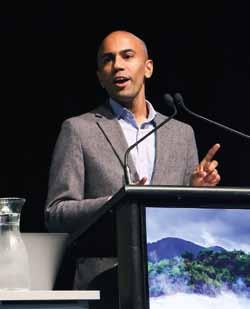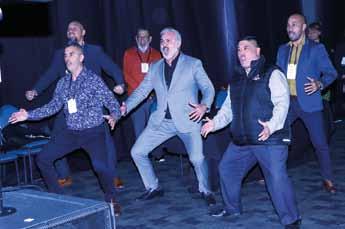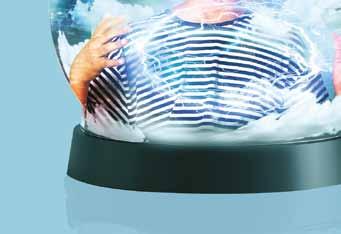
5 minute read
KIA HIwA rā
an issue. Social media, she said, played a big part in the way we live. Many kids today compare themselves to others in the way they look. They look at themselves and see that they are not good enough.
Aryan Emile-Chura saw a different issue. He said, ‘We are not taught to take our time. We need to slow down. We are always told we are not achieving fast enough.’
Zach Jans reinforced the views on social media saying, ‘There is massive pressure on social media. We are always conscious of the tragedies playing out daily on social and public media. It fatigues us. The global news is depressing and it [depression] builds up over time, so there is constant anxiety. You are forced to have an opinion on everything.’
Casinada’s next question was about how to manage our own hauora.
Paretoroa Webster-Tarei answered first saying ‘If I am feeling bullied I go back to my family, not to “Mackers” (MacDonalds). Family can bring you back to earth and help you through hardships. They love and support you.’
Rohm Dixon added that rangatahi don’t know how to talk about their feelings. We need to teach kids how to talk about feelings and when thy are older they will know how to talk to their elders.
Next Casinada asked, ‘When we are talking about COVID and
climate change and housing, how can teachers help you not to become overwhelmed?’ Helena Dou’ble answered, ‘By being understanding. Students need to know they can come to a teacher because the teacher is like part of the family and that comforts them. I thank the principals for being so great through COVID because they were like family.’ Haeun Kang followed a similar theme saying, ‘Identify those that struggle at home because they won’t do well at school. Have connections with your students and be their family.’ Hope Smith agreed saying, ‘Be understanding and open minded so each student has a support system. Some don’t have support at home for homework, so talk to them and look after them. Most of us don’t know what some students are going through. Support at school through staff helps.’ Aryan Emile-Chura said, ‘We need more love and compassion for everyone mC Jehan Casinada was as popular with the around us. Offer kindness, and smile audience as ever and ask how their day is going. It might save a life.’ Casinada then turned to what the panel thought makes them optimistic for the future? Paretoroa Webster-Tarei said, ‘My plans for the future? I will get a scholarship to get into the performing arts. My dream is


drab to fab!
From
If your school buildings are looking tired and in need of a new colour scheme Resene Colour Experts can help you rejuvenate your school’s look with free colour advice.





Bring out the best in your school with Resene School Services!
Find out more at: resene.co.nz/schoolservices
to get into the Juilliard School of Music in New York and study operatic music!’
Helena Dou’ble announced that next year she is applying for the Army. ‘I am protective of my family and friends and now I can protect my people and my community. To serve communities I would love to be a medic and help refugees in poverty.’
Rohm Dixon offered his ideas for the future saying we need many more inventions to solve the problems of today. We have to be open-minded about that and push for more inventions. Then the world would be a better place
Zach Jans said, ‘Having this panel at your conference shows optimism for change. You’ve all showed up here and you have listened to us. That makes me hopeful for our future and the future’s future.’
Hope Smith said ‘Seeing Rangatahi Māori thrive and grow as leaders is my dream. To see students at my Kura as leaders would create a legacy for our Kura and a legacy for New Zealand and the world. My personal future will be at university doing a Bachelor of Social Sciences in Psychology and Indigenous Studies.’
Rohm Dixon said hearing other people’s ambitions motivates him, like Paretoroa’s dream [to sing opera in New York].
Zach Jans added, ‘This is our generation and the people next
to me are going to make huge changes helping our planet. I will do a teacher’s degree and a Bachelor degree in Science and Commerce for secondary teaching.’ Isidora Gonzalez-Diaz said she would be studying political science at university. She then put a plug in for the Arts. ‘I do school, go home, do some painting and feel good. It’s a solution to the overwhelming issues.’ She also put a final plea to her audience saying, ‘Please put recycling bins in all schools, and teach us solutions. Look to Māori because they know how to look after the land, and then let’s make those solutions happen.’ This was a conference to savour. Filled with provocative and interesting presenters, totally committed to their respective The Te Akatea executive perform an impassioned haka to values and visions. Every honour myles Ferris keynote tugged at the audience’s conscience and shifted their perspective. We connected to a Pacific world view with Filivaifale Jason Swann and jumped on board the greatest migration journey in history with Sir Ian Taylor. Rawiri Waru took us on a different journey from school run-away to Science Fair Exhibiter in Hanover and finally the students of Rotorua High Schools gave us their unique and youthful perspectives on their direction for the future. Six hundred school principals could not have spent their week more productively.

Help students cope when everything gets shaken up




Teach your class how to find calm in an emotional storm. Pause Breathe Smile is a mind health programme designed for New Zealand primary and intermediate school children, proudly funded by Southern Cross. Research shows it increases wellbeing, reduces stress and boosts conflict resolution skills. Enquire online to book your school’s PLD www.pausebreathesmile.nz





